| The Ballot of 1876 & The Cease of Reconstruction |  | | Early on Life
Rutherford Birchard Hayes was built-in and raised in Ohio past a moralistic single mother later on his male parent died ten weeks before Rutherford was born. " Rud" developed a very close relationship with his sister, Fanny Hayes, who encouraged him to pursue law equally a career. With the help of a wealthy uncle, Hayes went to Harvard Law School, and and so made a proper name for himself as a successful criminal defense lawyer. He married Lucy Ware Webb, a girl who came from a wealthy, liberal, and politically active family. Lucy was a stiff laic in the abolition of slavery, in women's rights, and in temperance (her nickname was "Lemonade Lucy") and she influenced her husband to believe strongly in these causes as well. When the Civil War broke out, Hayes was already near forty and the father of 3 with a 4th on the way. Nevertheless, he was 1 of the first volunteers, stating that he would rather die in the disharmonize than live having done zilch for the Matrimony. Using his political connections, Hayes was appointed a major in the 23rd Ohio Volunteers. An officer with no military machine | | | | experience, he had to work hard to gain the respect of the enlisted men, a task he achieved with his "intense and ferocious" demeanor on the battlefield. At the Battle of Winchester, he captured an artillery position in hand to hand combat. Hayes turned downwards safe desk jobs and higher ranked positions with other regiments because he was so loyal to the 23rd. Wounded 5 times in the war, Hayes kept coming back to the fight, and by the end of the conflict he was a major general awarded a medal for "gallant and distinguished services." During this time, he was asked to run for the U.South. Business firm of Representatives. Hayes refused to campaign, stating that "an officeholder fit for duty who at this crisis would abandon his post to electioneer for a seat in Congress ought to exist scalped." When word came to him across telegraph wires that he had been elected, Hayes responded that Congress would take to wait; there was a war to exist won. Early Political Career
Afterward the Civil War, Hayes served as member of the U.South. House of Representatives (1865-68). He voted in favor of Andrew Johnson'south impeachment. He was elected as governor of Ohio in 1868 and was twice reelected. Republicans quickly recognized Hayes equally presidential material. | | | Ballot of 1876
The election of 1876 came downward to a fight between Hayes and Democrat Samuel Tilden of New York in one of the well-nigh hostile, controversial campaigns in American history (until 2000). Tilden won the popular vote and led in the electoral college, 184-166, but xix votes from three Republican-controlled states (Louisiana, Florida, and South Carolina) remained disputed. Oregon's count was also challenged. Allegations of widespread voter fraud forced Congress to prepare upwards a special electoral commission to determine the winner, equanimous of fifteen congressmen and Supreme Court justices. The commission finally announced their decision but two days before the inauguration. The vote was 8-7 along party lines to award the disputed electoral college votes to Hayes, making him the winner. Southern Democrats threatened rebellion over what they saw as a stolen election, forcing a deal to placate them. The deal is often referred to as "The Compromise of 1877." Fifty-fifty so, Democrats sneered at the deal, dubbing Hayes "Rutherfraud" and "His Fraudulency." | | | | 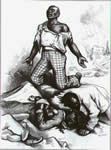
"Is This a Republican form of government?", Harper'south Weekly, September 2, 1876, past Thomas Nast
| 
"He Wants Change Too," Harper's Weekly, October 28, 1876, by Thomas Nast | 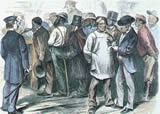
Engraving of Black Americans Voting in Richmond, Virginia, 1876 | 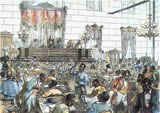
During the disputed 1876 S Carolina Gubernatorial campaign, blacks forcefulness their fashion into the legislative chamber | 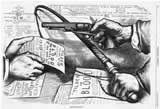 "Compromise--Indeed!", Harper's Weekly, January 27, 1876, by Thomas Nast "Compromise--Indeed!", Harper's Weekly, January 27, 1876, by Thomas Nast | 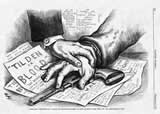
"A Truce--Non a Compromise," Harper'south Weekly, February 17, 1877, past Thomas Nast | | | | | | A Man (and Woman) of Principles
The Hayes family unit was religious and make clean-living. President Hayes did not drink or smoke, and. Lucy Hayes refused to serve any booze at White House affairs. Higher educated, politically acute, and a champion of social causes, Lucy Hayes was the first celebrity first lady since Dolly Madison. Though she dressed simply and wore no cosmetics, she was greatly esteemed by the public. One article praised her compassion after a trip with the president to the former Confederacy: "Southern women, who hated the very name Northerner, put their arms around her neck, and poured their bitterness and sorrow into her ears." Effect: The End of Reconstruction
The policies of Rutherford B. Hayes, America's 19th president, began to heal the nation later the ravages of the Civil War. He was well suited to the task, having earned a steadfast reputation for integrity throughout his | | | | career every bit a soldier and a statesman. Hayes had a reputation for being upstanding, moral, and honest, despite the controversial ballot. Much of Hayes'south 1877 inaugural address was devoted to calming down the denizens. He apace appear plans for election reform and pledged his earnest desire to heal the rift betwixt North and Due south. Though he had generally supported Reconstruction, which aimed to secure the rights of black citizens, Hayes came to believe that interventionist policies were breeding more than hatred amidst southerners, preventing the nation from healing itself in the aftermath of war. One month after taking office, Hayes ordered federal troops out of the Southward, ending Reconstruction altogether and allowing the Democratic Party to sweep in and assert total authority of the region. The Democratic hold on the South resulted in a complete denial of rights for blacks, including the right to vote, for near a century. | | | | pinnacle | | 
| | | |  | |  |  | | Last modified July eleven, 2012 | 



 "Compromise--Indeed!", Harper's Weekly, January 27, 1876, by Thomas Nast
"Compromise--Indeed!", Harper's Weekly, January 27, 1876, by Thomas Nast
0 Response to "what led to the end of reconstruction quizlet"
Post a Comment